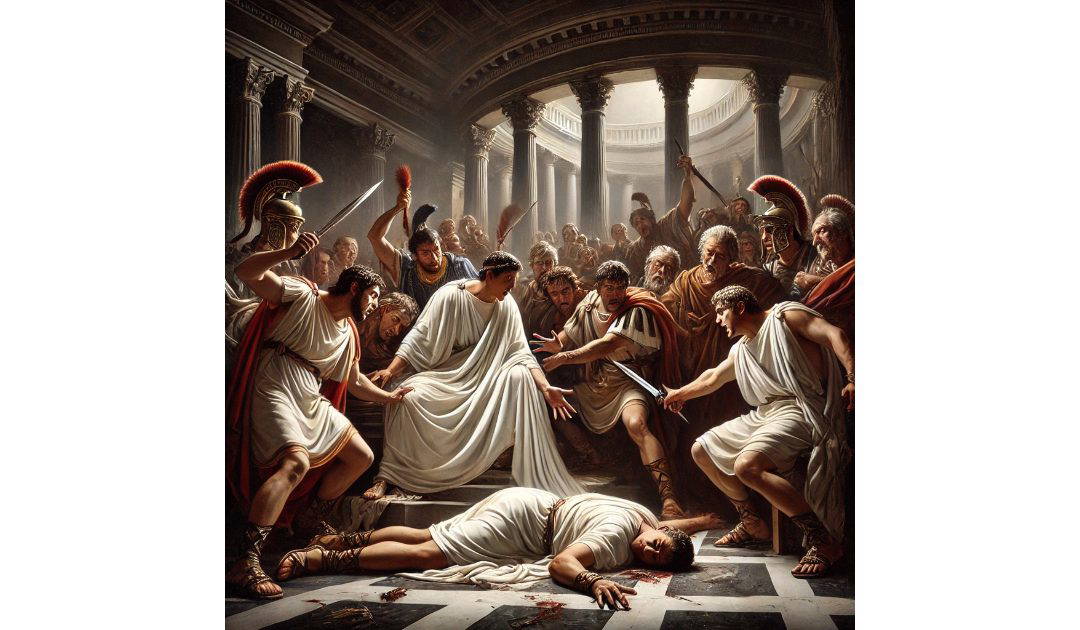The 15th of March is, of course, the Ides of March, and is the day on which Julius Caesar was assassinated. Julius Caesar is one of the most famous figures in history, a brilliant military commander and shrewd politician whose rise to power reshaped Rome forever. However, his dramatic fall was just as legendary, culminating in his assassination on the Ides of March, 44 BCE. His story is one of ambition, power, and betrayal—offering lessons that remain relevant today.
Born in 100 BCE to a patrician family, Gaius Julius Caesar grew up during a turbulent period in Roman history. Despite his aristocratic roots, his family was not particularly wealthy or influential. Caesar’s early political career began in the traditional Roman way—by seeking military and political offices. His connections, charisma, and intelligence quickly set him apart.
After surviving the dictator Sulla’s purge of political opponents, Caesar steadily rose through the ranks. He gained prominence as a skilled orator and advocate, serving in positions such as quaestor, aedile, and eventually, consul in 59 BCE. His ability to forge alliances was crucial to his success, and he partnered with two powerful figures—Pompey the Great and Crassus—to form the First Triumvirate, an informal political alliance that helped him secure power.
Caesar’s military career cemented his reputation as a leader of extraordinary talent. His conquest of Gaul (modern France) from 58-50 BCE demonstrated his tactical brilliance and ruthlessness. Through a series of decisive battles, he expanded Rome’s territory and gained immense wealth, loyalty from his troops, and widespread popularity among the Roman people.
His military campaigns, detailed in his own writings, Commentarii de Bello Gallico, showcased his leadership and cunning. However, his growing influence also made him a threat to Rome’s elite, particularly the Senate and his former ally, Pompey.
By 50 BCE, tensions between Caesar and the Senate reached a breaking point. The Senate, under pressure from Pompey, ordered Caesar to disband his army and return to Rome. Instead, in 49 BCE, he famously crossed the Rubicon River with his legions, effectively declaring war on Rome. His phrase “Alea iacta est” (“The die is cast”) signified the irreversible nature of his decision.
The subsequent civil war between Caesar and Pompey saw Caesar emerging victorious. He defeated Pompey’s forces at the Battle of Pharsalus in 48 BCE, forcing his rival to flee to Egypt, where he was later assassinated. With his enemies vanquished, Caesar returned to Rome as its unchallenged ruler.
With his victory, Caesar was appointed dictator for life in 44 BCE. Unlike previous dictators, who held temporary emergency powers, Caesar’s position seemed permanent. He implemented numerous reforms, including:
- Calendar Reform: He introduced the Julian calendar, a forerunner of the modern Gregorian calendar.
- Debt Relief and Land Redistribution: He enacted policies to alleviate debt and provide land to veterans and the poor.
- Citizenship Expansion: He granted citizenship to many people in Rome’s provinces, broadening Rome’s political landscape.
- Governmental Efficiency: He restructured the Senate and appointed officials based on merit rather than aristocratic status.
While these reforms benefited many, they also alienated the traditional Roman elite, who feared Caesar was dismantling the Republic in favor of a monarchy.
Despite his popularity among the people, resentment among the Senate grew. Many senators, including former allies such as Brutus and Cassius, believed that Caesar’s rule threatened Rome’s Republican traditions. His acceptance of extravagant honours—such as having his image on coins and wearing a purple robe reminiscent of kings—fueled speculation that he sought to crown himself.
A final tipping point came during the Lupercalia festival in February 44 BCE when Mark Antony publicly offered Caesar a crown. Although he declined, the gesture reinforced suspicions that he aimed to become king.
A conspiracy of over 60 senators, including Brutus and Cassius, plotted to assassinate Caesar. On 15th of March, 44 BCE—the infamous Ides of March—Caesar arrived at the Senate House. As he took his seat, the conspirators surrounded him and stabbed him 23 times. According to legend, his last words were “Et tu, Brute?” expressing shock at Brutus’ betrayal.
His death plunged Rome into chaos. While the conspirators believed they were restoring the Republic, they had miscalculated. Caesar’s assassination led to a power struggle, culminating in another civil war. His heir, Octavian (later Augustus), emerged victorious and became Rome’s first emperor, marking the official end of the Roman Republic.
Despite his violent end, Julius Caesar left a lasting impact on Rome and the world. His military conquests expanded Rome’s influence, his political reforms reshaped governance, and his dramatic life story inspired countless works of literature, including Shakespeare’s Julius Caesar.
Ironically, his assassination, meant to preserve the Republic, instead accelerated its transformation into an empire under Augustus. Today, his name remains synonymous with power, ambition, and leadership.
Julius Caesar’s rise and fall serve as a reminder of the delicate balance between power and governance, and the consequences of unchecked ambition and political strife. His legacy continues to be studied and debated, proving that his influence, even over 2,000 years later, has never truly faded.

